
Hackathon: Pronunciation /ˈhakəˌTHän/. Informal. An event, typically lasting several days, in which a large number of people meet to engage in collaborative computer programming. (Oxford’s lexico.com).
By Sunday afternoon the 24-hour cramming was over. The 35 participants who’d showed up for Palm Coast’s first Beach Tech Hackathon were lining up for their rapid-fire presentations before a panel of six judges (all men), vie for bragging rights, $12,000 in prizes, and the chance to turn an architectural shell of an app into a viable tool that could address real-life challenges at organizations like AdventHealth’s hospitals.
Over the next 75 minutes and with Shark Tank-like rapidity, the eight teams pitched embryonic apps ranging from ways to streamline the redundant and error-prone registering process at the doctor’s to reducing weeks’-long wait times for appointments by taking advantage of other patients’ cancellations to a “PatientPilot” that would enable patients to more directly connect with their doctors and–the actual top winner–a “StressLess” app that would measure an individual’s stress levels and provide stress-reduction alternatives.
The presentation, by a team of computer scientists from the University of Florida and the University of Central Florida–Bailey Waldorf, Sarah Anderson, Trevor Klipfel, Logan Cundiff and Dax Tubach–provoked one of the more curious (or perhaps frightening) questions from one of the judges, Nick Klufas, the Palm Coast city councilman and a computer engineer himself: “As an employer, would I be able to recognize individual employees’ tendencies for their stress levels to be higher, introduce events that they can then act upon?” he asked, such as “force them” to take a walk and see if it makes a difference?
One of the team members answered more generally, saying his goal was to look at the “macros,” meaning the big-picture changes, such as offering Apple watches as incentives, along with a new gym provided by the company or the organization, with the data generated from the app providing the sort of variables that could determine whether the investment was worth it or not. But with a couple more questions from the judges, it was enough to win the $6,000 top prize.
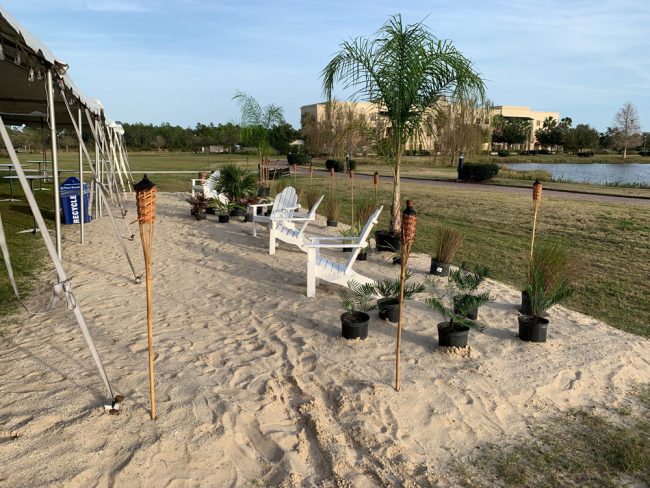
Hackathons have nothing to do with hacking your computer or your phone. As the Bemyapp organizers Palm Coast drafted to shepherd the project describe it, it’s about creative disruption: bringing energetic tech minds together, posing them a set of real-world challenges, and seeing what they come up with. Patrick Medina of BeMyApp, the company that does this for a living–for companies or as stand-alone events like Palm Coast’s, described hackathons as “yearly events that happen multiple times a year” in certain companies that want to shake creativity loose. BeMyApp’s clients have included several Fortune 500 companies. “Now we’re starting to move toward the public sector, doing things with City of Palm Coats, different communities that want solutions for their community,” Medina said. “We’ve worked with the Small Business Administrator for Small Business Week in D.C., we thought we’d give it a try here.”
Kewley, with what he said was $60,000 out of the Town Center Community Redevelopment Agency budget and $40,000 in contributions or sponsorships from such companies as AdventHealth, the Chiumento law firm, Coastal Cloud (Holland’s employer), the University of North Florida and others, was inspired by to recreate Dreamforcde’s atmospherics at City Hall.
That included a wellness room–or “zen space,” as he called it–in place of the customer service windows (with yoga classes), a video to “create the Palm Coast experience,” a selfie wall created by a local artist, a string quartet for the registration period, quality catering from Palm Coast’s World Plate Eatery (at St. Joe’s Plaza), drinks Friday evening with Mark Woods’s Fun Coast Bartending, “and you can’t have a tech beach hackathon if you don’t have a beach, right?” So he worked with Cline Construction to dump a rectangle of beach sand on the slope of the lake behind City Hall and make it “more beachy than anything else,” along with beach games, toy drones, tiki candles and music. That was all to make the cramming more pleasant.
It worked. City Hall’s usually staid parking lot became the sort of place where you could realistically see a Yang 2020 bumper sticker on a Scion, suggesting that something very different was afoot inside, as it very much was between Friday evening and Sunday afternoon.
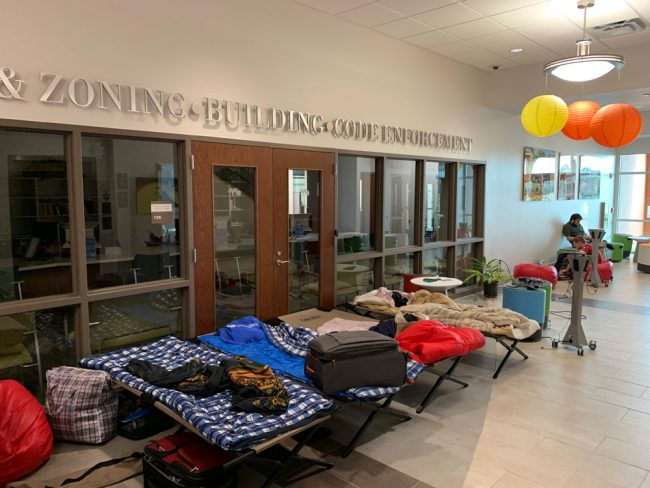
(Salesforce was one of the hackathon’s tools the developers were to work with: A lot of medical providers, including AventHealth, use the salesforce platform and its healthcloud, managing patient information and data, or to plug it into other Salesforce tools like Einstein, an artificial intelligence tool that uses predictive machine learning to identify issues or make more accurate, analytical forecasts. The platform can also aggregate all sorts of apps through the same dashboard.)
“I didn’t even know what the challenges were until we got here this morning, so it’s been a busy morning,” Lucio said during a Saturday interview.
All three gave the event high marks for the hackathon’s organization, Bemyapp’s savvy, the accommodations’ attention to detail–those atmospherics–and especially the food, which they said will help spread the word that there’s more than Domino’s at this event.
“It’s something people don’t even expect, because it’s usually a resort destination, people come down here for vacation,” Bikmetov said, contrasting Palm Coast with, say, various places in california’s tech zones or even Charlotte, where he went to college. “If this grows, I can foresee if they have more events like that, Florida has potential.”
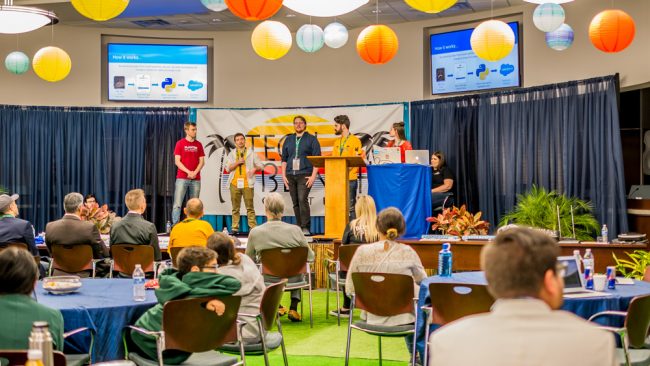
Vorndran had one organizational suggestion for future hackathons: to better connect ideas with the real world, she suggested adopting one other venue’s approach, which is to invite members of the business community to themselves pitch problems they’re seeking solutions for, then set the teams loose.
But there was little question about the seriousness and commitment of the event, from the participants’ perspective. “We were super excited,” Condon said of the opening ceremony, “to see that the mayor, the legislators, they all came to really provide truth that this is an honest, earnest workshop to really–the sky’s the limit kind of thing. Let people shine.” Legislators weren’t actually present, though Rep. Paul Renner texted his support during the opening ceremony, and those present included Daytona State College President Tom LoBasso and University of North Florida president David Szymanski, state Department of Education Chancellor Jacob Oliva, the former Flagler superintendent, and several local elected city officials, including of course Holland.
“We want to create that creativity for the next two days for you to actually focus on real problems that the healthcare industry is experiencing today,” she told the gathering Friday evening. “What’s exciting about the Tech Beach hackathon, it’s happening right here in our downtown. So why in our downtown? You are sitting in the middle of our innovation district,” she said, recognizing at that point the two other council members present: Klufas and Bob Cuff, who would make appearances throughout the weekend. “We wanted to be known and recognized within the medical industry promoting technology and innovation. We wanted to be different. We wanted to be unique. We wanted to understand the power of that technology.”
The rest of the evening was an illustration of the collaborative “launch-pad of what we’re going to experience for years to come” in the city, she said, pledging to repeat and amplify the event in future years.
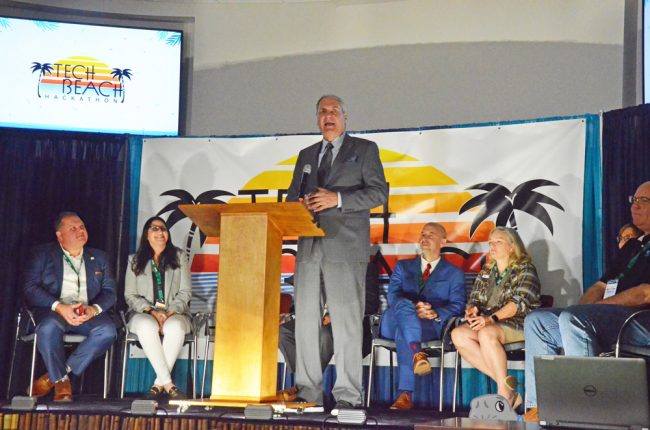
“Here,” said Tim Hale, co-owner of Coastal Cloud, the tech startup that in a few years grew to 200 employees, “we’ve got leaders from every facet of our lives, it’s the combination of those skills, the public-partnerships, educational aspect, the health care aspect, the city, it’s just hard to make that happen anywhere, and I think we’re a special place, we’re a small enough community to actually make it happen.”
The partnership has also drawn heavily on the Flagler County school system. Lynette Shott, the district’s director of community engagement, noted the district’s first-in-the-state commitment to placing a laptop or tablet in the hands of each student as an echo of the city’s latest innovations: “Where leadership is fearless and bold to remove barriers and sometimes move mountains,” she said, “to guide the organization into a future that is meaningful and powerful, that is an innovative culture, not an innovative initiative, and there is a huge difference between the two.”
Shott and the district would 24 hours later have plenty to applaud in the Hackathon’s Team Palm Coast–Flagler Palm Coast High School student Gavin Moreton and Daytona State College student Matthew Torres–who took third place, and $2,000.
“This is what we’re trying to build,” an exhausted Kewley said Friday, “a tech-oriented community, and we’re trying to bring start-ups to this community and trying to grow this community in a smart way, and so that we attract the kind of clean businesses and medical tech.” Kewley, Morton and city staff had Monday to return City Hall to its more prosaic uses, in time for their sum-up to the city council Tuesday morning.
![]()
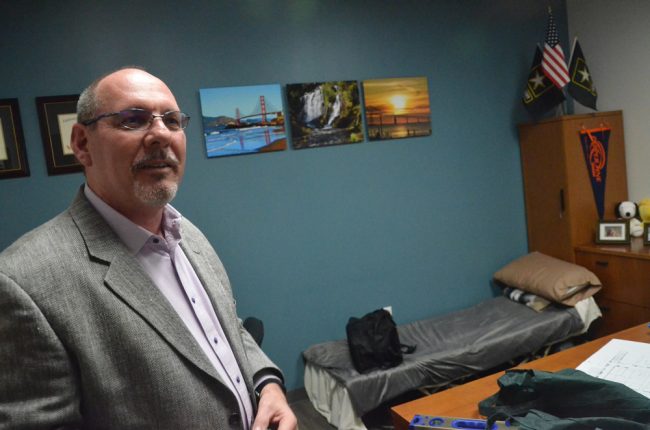





























Andy Montgomery says
Ms. Holland,
It would be and understatement to describe the Hackaton as “out- of-the-box” for a town the size of Palm Coast. Vision and job well done and a pleasure to watch my tax dollars fund efforts with such enormous pay back to both Palm Coast and Flagler Beach.
Didn’t know if you had seen this Zillow research – Why The Most Favorable Markets for Tech Expansion Aren’t Where You Might Think
https://www.zillow.com/research/tech-expansion-markets-2020-26332/
Having built engineering/computer science teams at BellSouth, AT&T, MCI, National Electronic Attachments and WebCallManager, the contributions to our communities both financial and social by these professionals are a blessing.
Our community needs a PT Barnum “hook” to quickly get the migration started. People flock where people are flocking. Done right, the press and public love the allure of Tiny Houses.
Have you ever thought about building a Geektown of Tiny Houses surrounded by millennial apartment/condos so Palm Coast might differentiate itself by offering a true Villiage to technocrats?
What could be the impact of subsidizing the housing cost for five years? Perhaps, build out quickly which in turn makes Palm Coast more attractive to diverse business enterprises.
There is a vision to provide housing for veterans in need that we might discuss, if you have interest.
Cheers,
🌴Andy Montgomery
2531 Lakeshore Drive
Flagler Beach, Fl 32136
386.999.1996
CB from PC says
If read correctly, according to the Hackathon article,
Coastal Cloud is Mayor Melissa “Holland’s employer”.
Interesting that Salesforce was the development tool used, and Coastal Cloud is a “Salesforce Platinum Consulting Partner”
according to their website.
Given this,
someone needs to explain how Coastal Cloud was able to obtain the contract to develop the Palm Coast Connect website.
Anyone know if this was a no-compete contract, or were there additional bidders?
Also, if you provide enough pizza and Yoga classes to software developers, they won’t realize a company will take that code and make real money.
Finally, I worked for a number of Fortune 100 Corporations in IT.
They have successfully been offshoring the U.S. IT industry for decades at the expense of wages, U.S. based IT employee jobs and standard of living.
Tiny houses for some tiny people in a tiny town who must think the rest of us are plain stupid.
FlaglerLive says
Coastal Cloud’s development of Palm Coadt Connect was on a voluntary basis.
Tired says
But how much did they “voluntarily” pay for the Salesforce licensing? More than the annual loaded salaries of their entire IT staff. Keep drinking the kool-aid. Or do real reporting and dig beneath Holland and Morton.
CB from PC says
No such thing as a free lunch.
Even if the initial website deployment was “voluntary”,
vendors always make money adding functional software modifications as business needs change, and by performing the usual software maintenancetasks. DIG A LITTLE, a company is in business to generate profits based on positive ROI where costs are less than revenue. Someone was paid a salary to put this together.
At some point, that outlay will be recouped, or the business will be out if business.